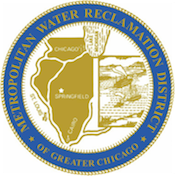Metropolitan Water Reclamation District of Greater Chicago
Environmental Monitor & Research Manager (#20003666)
General Statement
Under general direction, carries out or supervises basic and applied research projects of varied scope in relation to wastewater treatment processes, individually or in conjunction with other investigators.
Essential Job Functions
Essential job functions are fundamental, core functions common to positions in a classification. They are not intended to be an exhaustive list of all job duties for any one position in the class. Since class specifications are designed to be descriptive and not restrictive, incumbents may complete one or all of the job duties listed or tasks of similar kind not specifically listed here.
- Directs research in the fields of environmental sciences, environmental chemistry, environmental microbiology, sanitary engineering and environmental engineering.
- Develops, coordinates, and directs technical assistance projects for M&O and Engineering Departments.
- Reviews and prepares complex and technical manuscripts for publication and interim reports on research programs.
- Assigns, supervises and reviews work of subordinate personnel; rewards, disciplines, directs or adjusts grievances of other employees or effectively recommends their hiring, transfer, suspension, layoff, recall, promotion or discharge.
- Plans, coordinates, and directs environmental and operations monitoring.
- Prepares Division budget including manpower, equipment, and materials.
- Conducts and participates in seminars and speaking engagements related to various research programs.
- Manages the submittal of regulatory required environmental monitoring reports.
Other Job Functions
- Performs other duties as assigned.
Environmental Conditions
May involve exposure to a variety of chemical and biological materials, some of which may be hazardous or toxic. May involve exposure to fumes and noxious odors.
Desirable Knowledge, Skills and Abilities
- Extensive knowledge in the principles, practices and techniques of wastewater treatment, including sludge processing.
- Extensive knowledge of research methods associated with water quality monitoring.
- Thorough knowledge of analytical techniques including gas chromatography.
- Thorough knowledge of statistical techniques used in analyzing data.
- Thorough knowledge of management and supervisory methods and procedures.
- Thorough knowledge of Federal and State of Illinois environmental regulation.
- Ability to supervise and coordinate professional, technical and support personnel engaged in research and related activities.
- Ability to direct, monitor and participate in the development of research projects.
- Ability to communicate effectively, orally and in writing.
Minimum Qualification Requirements
A master's degree or doctor of philosophy degree in water resources sciences, environmental engineering, sanitary engineering, environmental sciences (with emphasis on environmental biology or microbiology), soil science or chemistry from an accredited college or university. Eight years of research experience in the fields of wastewater and sludge treatment technology, including statistical analysis of data bases, environmental monitoring, biological monitoring of waterways, sludge management and advanced analytical techniques, with a least six years of such experience involved in the direct supervision of professional and technical personnel.
Substitution
Related graduate study above the master's degree may be substituted for the required non-supervisory experience on a year-for-year basis.
Promotional Requirement
- One year of service with the District as a Principal Environmental Scientist.
- Civil service status as a Principal Environmental Scientist.
CLASS: 20003666; EST: 9/1/1991; REV: 3/1/2025;
